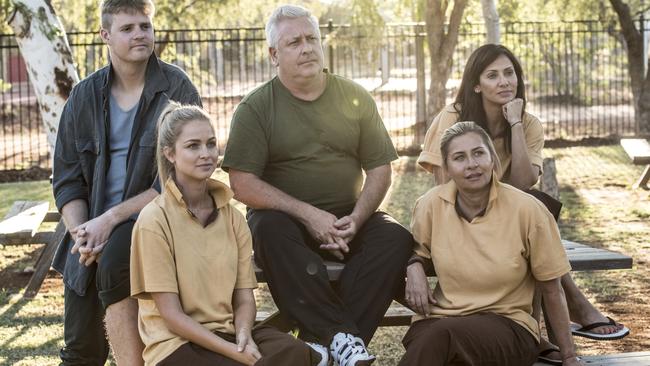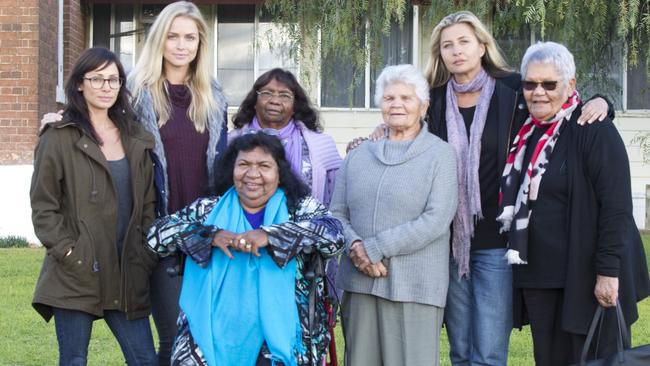Natalie Imbruglia on First Contact: ‘I was shocked by a lot of what I saw’
I went into First Contact blind, writes Natalie Imbruglia. The experiences I’ve had on the show have changed me.
Rendezview
Don't miss out on the headlines from Rendezview. Followed categories will be added to My News.
I went into First Contact blind.
I’ve always been interested in Aboriginal culture but admittedly knew very little about it. As a result of growing up where I did, I had minimal interaction with Aboriginal people.
Most of my knowledge of Aboriginal affairs had come from the media, and living in London, I don’t even get to see many of those stories. So I wanted the opportunity and chance to speak to Aboriginal people myself, to listen and learn and ask questions.
It was interesting not knowing where we were going on any given day on the journey, especially for people in the entertainment industry who are used to controlling their environment.
I was shocked by a lot of what I saw.
In Kununurra, one of the first places we travelled to, the high suicide rates often connected to alcoholism really struck me. A lot of my friends with addiction have AA or therapy — any addiction to that extent needs constant attention; sometimes it’s for life. So it was shocking that there didn’t seem to be any adequate rehab available. It seemed so cyclical and sad.

We visited a group who got together to talk about the suicide situation in the town. I met a man who had scars on his throat vocal cords from a suicide attempt and he could barely talk. He was convinced that if you take alcohol out of the situation you would decrease the suicide levels. It was reassuring at least to know that these groups are getting together and talking to break down the issue as taboo.
We learned about the inherited trauma that many Aboriginal people deal with, which was a new concept to me. People we spoke to had not necessarily had traumatic experiences directly, but the feelings of pain from their parents past are passed through generations and the trauma doesn’t necessarily heal.
Meeting members of the Stolen Generation — Isobel, Lorraine, Doreen and Fahye — who were all victims of direct childhood trauma, had a big impact on me. I was floored hearing them talk about walking to school one day, being taken away and never seeing their parents and siblings again.
For someone to suggest they were taken for their own welfare is insulting.
One of the women, Doreen, showed me a report where people from the government had come around and assessed her family and stated that she had a healthy happy home. She asked, “Why was I taken?” There was absolutely no reason — no reports of violence or not being fed. Perhaps in some cases children were taken for good reason, as David Oldfield was quick to tell us, but clearly not in this case.

We stayed overnight in a girls’ home where these women were trained to effectively take care of white folk — not by their choice. They were told to dress white, think white and act white. They were also told to stop speaking in their native tongue.
It was hard to watch the women walk in and be physically traumatised, literally shaking in the room where they were beaten up as children. I can’t imagine what it was like for them — some were told their siblings were dead and not to look for them, which they later found out was a lie.
These women were some of the most inspiring people I had ever met. They wanted to heal and move on and do something positive and proactive for their people.
These experiences have changed me. A lot of what I thought previously about Aboriginality was probably romanticised and I now have a less romantic vision.
Learning the reality of how it is for Aboriginal people in the modern world is confronting and at times disappointing, but there is hope! We met some people along the way who showed great resilience and strength.
Fixing the problems facing Aboriginal people could so easily be put in the too hard basket. But that’s not an option. You can’t tell people to move over and get on with it. We need to put pressure on the government to prioritise these issues and empower the people within their Aboriginal communities who are inspired to help and make change a reality.
First Contact is an important program; a small step at bridging the gap by making sure Aboriginal people aren’t out of sight and out of mind.
If the program inspires a few people to take a trip, if it opens people’s hearts to understanding Aboriginal people and their culture a little more, then I’m proud to have been a part of it.
First Contact airs Tuesday, Wednesday and Thursday this week at 8.30pm on SBS and NITV


